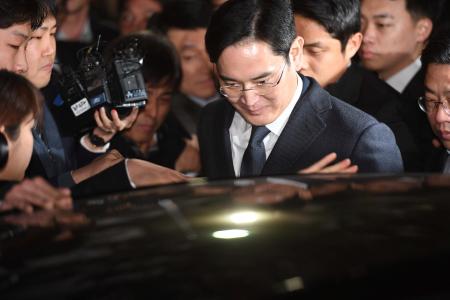
By Hyunjoo Jin and Joyce Lee
SEOUL (Reuters) – Samsung Group chief Jay Y. Lee was arrested early on Friday over his alleged role in a corruption scandal rocking the highest levels of power in South Korea, dealing a fresh blow to the world’s biggest maker of smartphones and memory chips.
The 48-year-old Lee, scion of the country’s richest family, was taken into custody at the Seoul Detention Centre after waiting there overnight for the decision. He was being held in a single cell with a TV and desk, a jail official said.
Lee is a suspect in the influence-peddling scandal that led parliament to impeach President Park Geun-hye in December, a decision that if upheld by the Constitutional Court would make her the country’s first democratically elected leader forced from office.
Shares in flagship Samsung Electronics Co Ltd fell 1.1 percent, while shares in Samsung C&T Corp, the de facto holding company of Samsung Group, were down 2.8 percent compared with the wider market’s drop of 0.2 percent.
Prosecutors have up to 10 days to indict Lee, Samsung’s third-generation leader, although they can seek an extension. After indictment, a court would be required to make a ruling within three months.
No decision had been made on whether Lee’s arrest would be contested or whether bail would be sought, a spokeswoman for Samsung Group [SARG.UL] said.
Samsung and Lee have denied wrongdoing in the case.
“We will do our best to ensure that the truth is revealed in future court proceedings,” the Samsung Group said in a brief statement after Lee’s arrest.
The same court had rejected a request last month to arrest Lee, but prosecutors on Tuesday brought additional accusations against Lee, seeking his arrest on bribery and other charges.
“We acknowledge the cause and necessity of the arrest,” a judge said in his ruling.
The judge rejected the prosecution’s request to arrest Samsung Electronics president Park Sang-jin.
SENSITIVE TIME
While Lee’s detention is not expected to hamper day-to-day operation of Samsung firms, which are run by professional managers, experts said it could hinder strategic decision-making at South Korea’s biggest conglomerate, or chaebol.
Samsung has been in the midst of an ongoing restructuring to clear a succession path for Lee to assume control after his father was incapacitated by a heart attack in 2014.
Decisions that could be complicated by Lee’s arrest include deliberations over whether to reorganize the group under a holding company structure, as well as its plan to abandon its future strategy office, a central decision-making body that came in for criticism during the scandal.
Staff moves have also been in limbo. Samsung, which employs around half a million people, has yet to announce annual personnel promotions and changes, which it typically does in December.
One employee at Samsung Electronics’ chip division said colleagues were unsettled that prosecutors had singled-out Samsung.
“The mood is that people are worried,” said the employee.
However, another Samsung Electronics employee described the situation as business as usual.
“It wouldn’t make sense for a company of that size to not function properly just because the owner is away.”
Both declined to be identified, given the sensitivity of the matter.
Lee’s incarceration comes as Samsung Electronics tries to get past the disastrous rollout last year of its Galaxy Note 7 smartphones, which were prone to fires. It is under pressure for the upcoming launch of its next flagship phone, the Galaxy S8, to be a success.
Major business groups criticised the decision, worried about the impact on Samsung.
“A management vacuum at Samsung, a global company representing the Republic of Korea, will increase uncertainty and undermine global confidence, posing a big burden on the already struggling economy,” the Korea Employers Federation said.
ZEROING-IN
Lee’s arrest gives a boost to prosecutors who have zeroed-in on Samsung Group to build their case against President Park and her close friend Choi Soon-sil, who is in detention and faces charges of abuse of power and attempted fraud.
Both Park and Choi have denied wrongdoing.
Prosecutors have focused on Samsung’s relationship with Park, 65, accusing the group of paying bribes totalling 43 billion won ($37.74 million) to organizations linked to Choi to secure government backing for the controversial 2015 merger of two Samsung units, a deal that was seen as key to smoothing Lee’s succession.
If parliament’s impeachment is upheld, an election would be held in two months. In the meantime, Park remains in office but stripped of her powers.
Her would-be successors praised the decision to arrest Lee.
“We hope it marks a beginning to end our society’s evil practice of cozy ties between government and corporations and move towards a fair country,” said Kim Kyoung-soo, a spokesman for Moon Jae-in, a member of the liberal opposition Democratic Party who is leading opinion polls in the presidential race.
(Additional reporting by Ju-min Park and Cynthia Kim; Writing by Tony Munroe; Editing by Lincoln Feast)